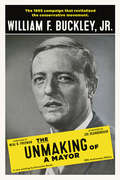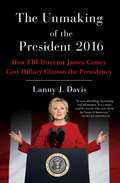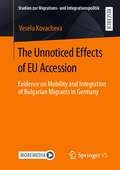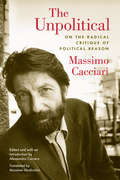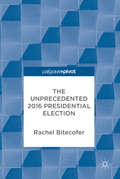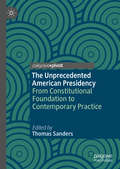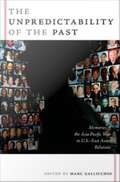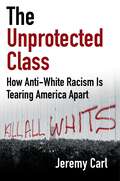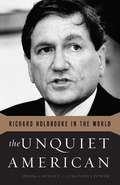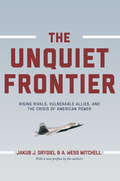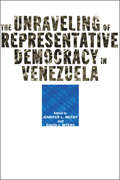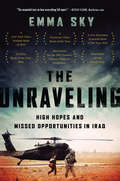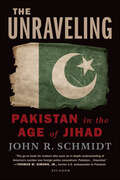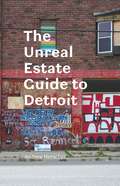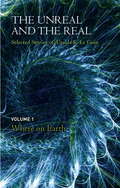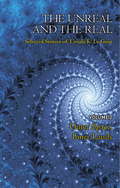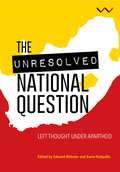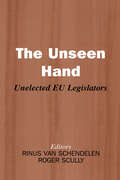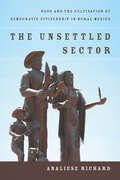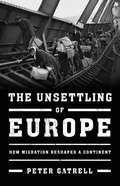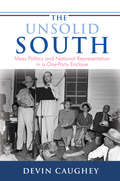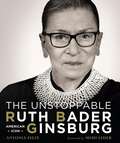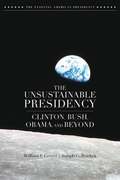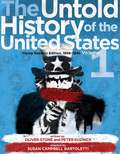- Table View
- List View
The Unmaking of a Mayor
by William F. Buckley Jr.John V. Lindsay was elected mayor of New York City in 1965. But that year's mayoral campaign will forever be known as the Buckley campaign. "As a candidate," Joseph Alsop conceded, "Buckley was cleverer and livelier than either of his rivals." And Murray Kempton concluded that "The process which coarsens every other man who enters it has only refined Mr. Buckley."The Unmaking of a Mayor is a time capsule of the political atmosphere of America in the spring of 1965, diagnosing the multitude of ills that plagued New York and other major cities: crime, narcotics, transportation, racial bias, mismanagement, taxes, and the problems of housing, police, and education. Buckley's nimble dissection of these issues constitutes an excellent primer of conservative thought.A good pathologist, Buckley shows that the diseases afflicting New York City in 1965 were by no means of a unique strain, and compared them with issues that beset the country at large. Buckley offers a prescient vision of the Republican Party and America's two-party system that will be of particular interest to today's conservatives. The Unmaking of a Mayor ends with a wistful glance at what might have been in 1965-and what might yet be.
The Unmaking of the President 2016: How FBI Director James Comey Cost Hillary Clinton the Presidency
by Lanny J. DavisA longtime Washington insider argues that former FBI Director James Comey’s letter to Congress, sent just before the presidential election in 2016 was a key determining factor in Trump’s win: “Compelling criticism…lapsed Trump supporters might well open their minds to this attorney’s scholarly, entirely convincing proof of the damage done” (Kirkus Reviews, starred review).During the week of October 24, 2016, Hillary Clinton was decisively ahead of Donald Trump in many polls and, more importantly, in the battleground states of Wisconsin, Michigan, and Pennsylvania. Then FBI Director James Comey sent his infamous letter to Congress on October 28, saying the bureau was investigating additional emails that may have been relevant to the Hillary Clinton email case. In The Unmaking of the President 2016, attorney Lanny J. Davis shows how Comey’s misguided announcement—just eleven days before the election—swung a significant number of voters away from Clinton, winning Trump an Electoral College victory—and the presidency. Davis traces Clinton’s email controversy and Comey’s July 2016 appearance before Congress, in which he said the Clinton email matter was effectively closed. From that moment until Comey’s late October letter to Congress, Davis says, Clinton was destined to be elected president by substantial popular and electoral vote margins. But the decision to send his October 28 letter, so near to the election, not only violated long-standing justice department policies but also contained no new facts of improper emails at all—just pure speculation. Davis shows state by state, using polling data before October 28, and on election day, how voter support for Hillary Clinton eroded quickly. He proves that had the election been held on October 27, Hillary Clinton would have won the presidency by a substantial margin. Despite so many other issues in the closing days of the campaign—Trump’s behavior, the Russian hacking, reports of Clinton momentum in marginal states such as Georgia, Arizona, even Texas—after the October 28 Comey letter, everything changed. References to “Clinton emails” and “new criminal investigation” dominated media coverage virtually round-the-clock through election day November 8. Now Davis proves with raw, indisputable data how Comey’s October surprise cost Hillary Clinton the presidency and changed American history in the blink of an eye.
The Unnoticed Effects of EU Accession: Evidence on Mobility and Integration of Bulgarian Migrants in Germany (Studien zur Migrations- und Integrationspolitik)
by Vesela KovachevaThis study provides empirical evidence on the considerable but often unnoticed impact of EU accession on the mobility and integration of migrants from Bulgaria in Germany. Original data from a time-location sampling survey in Hamburg reveal that free movement not only induced a high level of mobility among EU citizens from Bulgaria after 2007 but also enabled their more permanent settlement in Germany. The study also provides statistical evidence that EU citizenship contributed to better legal integration of Bulgarian migrants in Germany, but national policies shaped to a greater extent their integration in terms of participation in the core areas of life. Restrictive policies such as transitional periods in the freedom of work hampered labour market integration and created more disadvantaged positions for workers. Inclusive policies such as the dual citizenship policy facilitated the naturalisation of settled migrants and led to exceptionally high naturalisation rates for Bulgarians that point to their successful integration in society. However, integration successes remain almost unnoticed in public discourse, which is dominated by the image of Bulgarian migration as a challenge.
The Unpolitical: On the Radical Critique of Political Reason
by Massimo CacciariMassimo Cacciari is one of the leading public intellectuals in today's Italy, both as an outstanding philosopher and political thinker and as now three times (and currently) the mayor of Venice. This collection of essays on political topics provides the best introduction in English to his thought to date. The political focus does not, however, prevent these essays from being an introduction to the full range of Cacciari's thought.The present collection includes chapters on Hofmannstahl, Lukács, Benjamin, Nietzsche, Weber, Derrida, Schmitt, Canetti, and Aeschylus. Written between 1978 and 2006, these essays engagingly address the most hidden tradition in European political thought: the Unpolitical. Far from being a refusal of politics, the Unpolitical represents a merciless critique of political reason and a way out of the now impracticable consolations of utopia and harmonious community. Drawing freely from philosophy and literature, The Unpolitical represents a powerful contribution to contemporary political theory.A lucid and engaging Introduction by Alessandro Carrera sets these essays in the context of Cacciari's work generally and in the broadest context of its historical and geographical backdrop.
The Unprecedented 2016 Presidential Election
by Rachel BitecoferThis book explains the 2016 presidential election through a strategic focus. In the primaries both parties faced challenges from insurgent outsiders riding waves of populist fervor in the electorate, but only the Democrats were able to steer the nomination into the hands of their establishment favorite. Why weren't Republican elites able to stop Donald Trump from hijacking their party's nomination? Why did Hillary Clinton come up short on Election Day despite the fact that nearly everyone expected her to win after her opponent ran a haphazard campaign plagued by scandal after scandal? The research presented here argues that the Clinton campaign conducted the nearly perfect execution of the wrong electoral strategy, costing her the Electoral College and her chance to become America's first female president.
The Unprecedented American Presidency: From Constitutional Foundation to Contemporary Practice
by Thomas SandersThis Palgrave Pivot presents a comprehensive introduction along with four essays on the institution of the American presidency, reflecting on broad implications for American political culture and practice. Each by an eminent scholar of the presidency, these pieces provide a thorough understanding of the uniqueness of the executive office of government and its evolution, with special emphasis on twentieth and twenty-first century practices and challenges. Together, they help to shed light on the current political crisis, and explain the circumstances in which Donald Trump has come to occupy this central office of American democracy.
The Unpredictability of the Past: Memories of the Asia-Pacific War in U.S.-East Asian Relations
by Marc GallicchioIn The Unpredictability of the Past, an international group of historians examines how collective memories of the Asia-Pacific War continue to affect relations among China, Japan, and the United States. The contributors are primarily concerned with the history of international relations broadly conceived to encompass not only governments but also nongovernmental groups and organizations that influence the interactions of peoples across the Pacific. Taken together, the essays provide a rich, multifaceted analysis of how the dynamic interplay between past and present is manifest in policymaking, popular culture, public commemorations, and other arenas. The contributors interpret mass media sources, museum displays, monuments, film, and literature, as well as the archival sources traditionally used by historians. They explore how American ideas about Japanese history shaped U. S. occupation policy following Japan's surrender in 1945, and how memories of the Asia-Pacific War influenced Washington and Tokyo policymakers' reactions to the postwar rise of Soviet power. They investigate topics from the resurgence of Pearl Harbor images in the U. S. media in the decade before September 11, 2001, to the role of Chinese war museums both within China and in Chinese-Japanese relations, and from the controversy over the Smithsonian Institution's Enola Gay exhibit to Japanese tourists' reactions to the USS Arizona memorial at Pearl Harbor. One contributor traces how a narrative commemorating African Americans' military service during World War II eclipsed the history of their significant early-twentieth-century appreciation of Japan as an ally in the fight against white supremacy. Another looks at the growing recognition and acknowledgment in both the United States and Japan of the Chinese dimension of World War II. By focusing on how memories of the Asia-Pacific War have been contested, imposed, resisted, distorted, and revised, The Unpredictability of the Past demonstrates the crucial role that interpretations of the past play in the present. Contributors. Marc Gallicchio, Waldo Heinrichs, Haruo Iguchi, Xiaohua Ma, Frank Ninkovich, Emily S. Rosenberg, Takuya Sasaki, Yujin Yaguchi, Daqing Yang
The Unprotected Class: How Anti-White Racism Is Tearing America Apart
by Jeremy CarlAnti-white racism, undisguised and unembarrassed, is now official policy in America.One class of citizens—whites—is openly discriminated against in every sphere of public and private life. The Unprotected Class is a comprehensive explanation of how we got here and what we must do to correct a manifest—and dangerous—injustice. Launched with an appeal to justice for all, the civil rights movement went off the rails even as it achieved its original goals. Soon its excesses and failures were exploited to justify discrimination against whites in business, education, law, entertainment, and even the church. With the death of George Floyd and the shedding of all pretense of racial justice, vindictiveness, resentment, and hatred were unleashed in America.
The Unquiet American: Richard Holbrooke in the World
by Samantha Power Derek CholletRichard Holbrooke, who died in December 2010, was a pivotal player in U. S. diplomacy for more than forty years. Most recently special envoy for Iraq and Afghanistan under President Obama, Holbrooke also served as assistant secretary of state for both Asia and Europe, and as ambassador to both Germany and the United Nations. He had a key role in brokering a peace agreement among warring factions in Bosnia that led to the Dayton Peace Accords in 1995. Widely regarded to possess one of the most penetrating minds of any modern diplomat of any nation, Holbrooke was also well known for his outsized personality, and his capacity to charm and offend in equally colossal measures. In this book, the friends and colleagues who knew him best survey his accomplishments as a diplomat, activist, and author. Excerpts from HolbrookeOCOs own writings further illuminate each significant period of his career. "The Unquiet American" is both a tribute to an exceptional public servant and a backstage history of the last half-century of American foreign policy.
The Unquiet Frontier
by A. Wess Mitchell Jakub J. GrygielFrom the Baltic to the South China Sea, newly assertive authoritarian states sense an opportunity to resurrect old empires or build new ones at America's expense. Hoping that U.S. decline is real, nations such as Russia, Iran, and China are testing Washington's resolve by targeting vulnerable allies at the frontiers of American power. The Unquiet Frontier explains why the United States needs a new grand strategy that uses strong frontier alliance networks to raise the costs of military aggression in the new century.Jakub Grygiel and Wess Mitchell describe the aggressive methods rival nations are using to test U.S. power in strategically critical regions throughout the world. They show how rising and revisionist powers are putting pressure on our frontier allies--countries like Poland, Israel, and Taiwan--to gauge our leaders' commitment to upholding the U.S.-led global order. To cope with these dangerous dynamics, nervous U.S. allies are diversifying their national-security "menu cards" by beefing up their militaries or even aligning with their aggressors. Grygiel and Mitchell reveal how numerous would-be great powers use an arsenal of asymmetric techniques to probe and sift American strength across several regions simultaneously, and how rivals and allies alike are learning from America's management of increasingly interlinked global crises to hone effective strategies of their own.The Unquiet Frontier demonstrates why the United States must strengthen the international order that has provided greater benefits to the world than any in history.
The Unquiet Frontier: Rising Rivals, Vulnerable Allies, and the Crisis of American Power
by A. Wess Mitchell Jakub J. GrygielFrom the Baltic to the South China Sea, newly assertive authoritarian states sense an opportunity to resurrect old empires or build new ones at America's expense. Hoping that U.S. decline is real, nations such as Russia, Iran, and China are testing Washington's resolve by targeting vulnerable allies at the frontiers of American power. The Unquiet Frontier explains why the United States needs a new grand strategy that uses strong frontier alliance networks to raise the costs of military aggression in the new century.Jakub Grygiel and Wess Mitchell describe the aggressive methods rival nations are using to test U.S. power in strategically critical regions throughout the world. They show how rising and revisionist powers are putting pressure on our frontier allies—countries like Poland, Israel, and Taiwan—to gauge our leaders' commitment to upholding the U.S.-led global order. To cope with these dangerous dynamics, nervous U.S. allies are diversifying their national-security "menu cards" by beefing up their militaries or even aligning with their aggressors. Grygiel and Mitchell reveal how numerous would-be great powers use an arsenal of asymmetric techniques to probe and sift American strength across several regions simultaneously, and how rivals and allies alike are learning from America's management of increasingly interlinked global crises to hone effective strategies of their own.The Unquiet Frontier demonstrates why the United States must strengthen the international order that has provided greater benefits to the world than any in history.
The Unraveling of Representative Democracy in Venezuela
by Jennifer L. McCoy and David J. MyersFor four decades, Venezuela prided itself for having one of the most stable representative democracies in Latin America. Then, in 1992, Hugo Chávez Frías attempted an unsuccessful military coup. Six years later, he was elected president. Once in power, Chávez redrafted the 1961 constitution, dissolved the Congress, dismissed judges, and marginalized rival political parties. In a bid to create direct democracy, other Latin American democracies watched with mixed reactions: if representative democracy could break down so quickly in Venezuela, it could easily happen in countries with less-established traditions. On the other hand, would Chávez create a new form of democracy to redress the plight of the marginalized poor?In this volume of essays, leading scholars from Venezuela and the United States ask why representative democracy in Venezuela unraveled so swiftly and whether it can be restored. Its thirteen chapters examine the crisis in three periods: the unraveling of Punto Fijo democracy; Chávez's Bolivarian Revolution; and the course of "participatory democracy" under Chávez. The contributors analyze such factors as the vulnerability of Venezuelan democracy before Chávez; the role of political parties, organized labor, the urban poor, the military, and businessmen; and the impact of public and economic policy. This timely volume offers important lessons for comparative regime change within hybrid democracies. Contributors: Damarys Canache, Florida State University; Rafael de la Cruz, Inter-American Development Bank; José Antonio Gil, Yepes Datanalisis; Richard S. Hillman, St. John Fisher College; Janet Kelly, Graduate Institute of Business, Caracas; José E. Molina, University of Zulia; Mosés Naím, Foreign Policy; Nelson Ortiz, Caracas Stock Exchange; Pedro A. Palma, Graduate Institute of Business, Caracas; Carlos A. Romero and Luis Salamanca, Central University of Venezuela; Harold Trinkunas, Naval Postgraduate School.
The Unraveling: High Hopes and Missed Opportunities in Iraq
by Emma SkyWhen Emma Sky, an intrepid young British woman, volunteered to help rebuild Iraq after the overthrow of Saddam Hussein, she had little idea what she was letting herself in for: a tour that would last over a decade, longer than that of any senior military of political official. As the only adviser to the Coalition Provisional Authority in Kirkuk and the closest confidante to U. S. General Odierno, Sky was valued for her controversial voice and outsider’s point of view--during the most painful stages of the war, she was one of the few to develop friendships and relationships with both Iraqis and Americans alike. In the West, violence in Iraq is typically explained away as the symptom of psychopathic terrorists, blurring and arbitrary colonial borders, and ancient hatreds between Sunni and Shia. But the violence stems from weak governance and corrupt elites, empowered by the U. S. -led coalition, who use sectarianism to mobilize support and fail to deliver service to the meet the needs of the country’s citizens. Women and men, Iraqis and Americans, soldiers and civilians, the ordinary and yet extraordinary, Western cultures and Eastern all collide in Iraq. Since the beginning of the invasion in 2003, Sky has been a tireless witness to American efforts to impose democracy on a country traumatized by decades of war and sanctions, newly liberated from the most brutal of regimes; the Iraqi who became insurgents and the insurgencies that morphed into civil war; the 2007 surge and then the drawdown of U. S. troops; the pitfalls and limitation of foreign powers; and the takeover by the Islamic State. A consummate insider, called the "modern-day Gertrude Bell” by the London Times, Sky provides insight into the ordered world of the US military, the complexities, diversity and evolution of Iraqi society during in the last ten years of uninterrupted conflict and the struggle to find stability in post-Saddam Iraq. With sharp detail, tremendous empathy and devotion to all those who served--The Unraveling is an intimate portrait of Americans who killed and cared, of friendships, humanity, the quest for peace and the failure of United States strategy.
The Unraveling: Pakistan in the Age of Jihad
by John R. SchmidtHow did a nation founded as a homeland for South Asian Muslims, most of whom follow a tolerant nonthreatening form of Islam, become a haven for Al Qaeda and a rogue's gallery of domestic jihadist and sectarian groups? In this groundbreaking history of Pakistan's involvement with radical Islam, John R. Schmidt, the senior U.S political analyst in Pakistan in the years before 9/11, places the blame squarely on the rulers of the country, who thought they could use Islamic radicals to advance their foreign policy goals without having to pay a steep price. This strategy worked well at first--in Afghanistan during the anti-Soviet jihad, in Kashmir in support of a local uprising against Indian rule, and again in Afghanistan in backing the Taliban in the Afghan civil war. But the government's plans would begin to unravel in the wake of 9/11, when the rulers' support for the U.S. war on terror caused many of their jihadist allies to turn against them. Today the army generals and feudal politicians who run Pakistan are by turns fearful of the consequences of going after these groups and hopeful that they can still be used to advance the state's interests.The Unraveling is the clearest account yet of the complex, dangerous relationship between the leaders of Pakistan and jihadist groups—and how the rulers' decisions have led their nation to the brink of disaster and put other nations at great risk. Can they save their country or will we one day find ourselves confronting the first nuclear-armed jihadist state?
The Unreal Estate Guide to Detroit
by Andrew HerscherIntense attention has been paid to Detroit as a site of urban crisis. This crisis, however, has not only yielded the massive devaluation of real estate that has so often been noted; it has also yielded an explosive production of seemingly valueless urban property that has facilitated the imagination and practice of alternative urbanisms. The first sustained study of Detroit s alternative urban cultures, The Unreal Estate Guide to Detroit initiates a new focus on Detroit as a site not only of urban crisis but also of urban possibility. The Guide documents art and curatorial practices, community and guerilla gardens, urban farming and forestry, cultural platforms, living archives, evangelical missions, temporary public spaces, intentional communities, furtive monuments, outsider architecture, and other work made possible by the ready availability of urban space in Detroit. The Guide poses these spaces as unreal estate: urban territory that has slipped through the free- market economy and entered other regimes of value, other contexts of meaning, and other systems of use. The appropriation of this territory in Detroit, the Guide suggests, offers new perspectives on what a city is and can be, especially in a time of urban crisis. "
The Unreal and the Real Volume 1: Selected Stories of Ursula K. Le Guin: Where on Earth
by Ursula K. Le Guin'Le Guin's storytelling is sharp, magisterial, funny, thought-provoking and exciting, exhibiting all that science fiction can be' EMPIREThe Unreal and the Real is a two-volume collection of stories, selected by Ursula Le Guin herself, and spans the spectrum of fiction from realism through magical realism, satire, science fiction, surrealism and fantasy. Volume One, WHERE ON EARTH, focuses on Le Guin's interest in realism and magical realism and includes 18 of her satirical, political and experimental earthbound stories. Highlights include WORLD FANTASY and HUGO AWARD-winner 'Buffalo Gals, Won't You Come Out Tonight', the rarely reprinted satirical short, 'The Lost Children', JUPITER AWARD-winner, 'The Diary of the Rose' and the title story of her PULITZER PRIZE finalist collection 'Unlocking the Air'.
The Unreal and the Real Volume 2: Selected Stories of Ursula K. Le Guin: Outer Space & Inner Lands
by Ursula K. Le Guin'She is unique. She is legend' THE TIMES'Le Guin is a writer of enormous intelligence and wit, a master storyteller with the humor and the force of a Twain' BOSTON GLOBE'Her stories will pass into legend, to touch many generations to come' GUARDIANTHE UNREAL AND THE REAL is a two-volume collection of stories, selected by Ursula Le Guin herself, and spans the spectrum of fiction from realism through magical realism, satire, science fiction, surrealism and fantasy.Volume Two, OUTER SPACE, INNER LANDS, showcases Le Guin's acclaimed stories of the fantastic, originally appearing in publications as varied as AMAZING STORIES, PLAYBOY, the NEW YORKER and OMNI, and contains 20 stories, including modern classics such as the HUGO AWARD-winning 'The Ones Who Walk Away From Omelas', NEBULA-nominee 'Nine Lives'; JAMES TIPTREE, JR MEMORIAL AWARD-winner (and HUGO and NEBULA-nominee) 'The Matter of Seggri'; NEBULA AWARD-winner 'Solitude'; and the secret history 'Sur', which was nominated for the HUGO AWARD and included in THE BEST AMERICAN SHORT STORIES.
The Unresolved National Question in South Africa: Left thought under apartheid and beyond
by Edward Webster & Karin PampallisThis volume examines the way in which various strands of left thought have addressed the National Question. The re-emergence of debates on the decolonisation of knowledge has revived interest in the National Question, which began over a century ago and remains unresolved. Tensions that were suppressed and hidden in the past are now being openly debated. Despite this, the goal of one united nation living prosperously under a constitutional democracy remains elusive. This edited volume examines the way in which various strands of left thought have addressed the National Question, especially during the apartheid years, and goes on to discuss its relevance for South Africa today and in the future. Instead of imposing a particular understanding of the National Question, the editors identified a number of political traditions and allowed contributors the freedom to define the question as they believed appropriate - in other words, to explain what they thought was the Unresolved National Question. This has resulted in a rich tapestry of interweaving perceptions. The volume is structured in two parts. The first examines four foundational traditions: Marxism-Leninism (the Colonialism of a Special Type thesis); the Congress tradition; the Trotskyist tradition; and Africanism. The second part explores the various shifts in the debate from the 1960s onwards, and includes chapters on Afrikaner nationalism, ethnic issues, black consciousness, feminism, workerism and constitutionalism. The editors hope that by revisiting the debates not popularly known among the scholarly mainstream, this volume will become a catalyst for an enriched debate on our identity and our future.
The Unseen Hand: Unelected EU Legislators
by Roger Scully Rinus Van SchendelenWho is really making EU laws and regulations? Formally, and according to most popular accounts, responsibility lies with European politicians who are directly elected (MEPs) or indirectly accountable to elected bodies at the European or national level (council). In practice, however, as this book shows, things can be very different. The real makers of European legislation and rules are frequently unelected and far from the public gaze. This book describes and evaluates the role of many such unseen lawmakers, including commission officials, experts from national governments and companies, lobbyists, secretaries of the council and others.
The Unsettled Sector: NGOs and the Cultivation of Democratic Citizenship in Rural Mexico
by Analiese RichardIn late twentieth century Mexico, the NGO "boom" was hailed as an harbinger of social change and democratic transition, with NGOs poised to transform the relationship between states and civil society on a global scale. And yet, great as the expectations were for NGOs to empower the poor and disenfranchised, their work is rooted in much older civic and cultural traditions. Arguably, they are just as much an accomplice in neoliberal governance. Analiese Richard seeks to determine what the growth of NGOs means for the future of citizenship and activism in neoliberal democracies, where a widening chasm between rich and poor threatens democratic ideals and institutions. Analyzing the growth of NGOs in Tulancingo, Hidalgo, from the 1970s to the present, The Unsettled Sector explores the NGOs' evolving network of relationships with donors, target communities, international partners, state agencies, and political actors. It reaches beyond the campesinos and farmlands of Tulancingo to make sense of the NGO as an institutional form. Richard argues that only if we see NGOs as they are--bridges between formal politics and public morality--can we understand the opportunities and limits for social solidarity and citizenship in an era of neoliberal retrenchment.
The Unsettling of Europe: How Migration Reshaped a Continent
by Peter GatrellAn acclaimed historian examines postwar migration's fundamental role in shaping modern Europe Migration is perhaps the most pressing issue of our time, and it has completely decentered European politics in recent years. But as we consider the current refugee crisis, acclaimed historian Peter Gatrell reminds us that the history of Europe has always been one of people on the move. The end of World War II left Europe in a state of confusion with many Europeans virtually stateless. Later, as former colonial states gained national independence, colonists and their supporters migrated to often-unwelcoming metropoles. The collapse of communism in 1989 marked another fundamental turning point. Gatrell places migration at the center of post-war European history, and the aspirations of migrants themselves at the center of the story of migration. This is an urgent history that will reshape our understanding of modern Europe.
The Unsolid South: Mass Politics and National Representation in a One-Party Enclave (Princeton Studies in American Politics: Historical, International, and Comparative Perspectives #159)
by Devin CaugheyDuring the Jim Crow era, the Democratic Party dominated the American South, presiding over a racially segregated society while also playing an outsized role in national politics. In this compelling book, Devin Caughey provides an entirely new understanding of electoral competition and national representation in this exclusionary one-party enclave. Challenging the notion that the Democratic Party’s political monopoly inhibited competition and served only the Southern elite, he demonstrates how Democratic primaries—even as they excluded African Americans—provided forums for ordinary whites to press their interests.Focusing on politics during and after the New Deal, Caughey shows that congressional primary elections effectively substituted for partisan competition, in part because the spillover from national party conflict helped compensate for the informational deficits of elections without party labels. Caughey draws on a broad range of historical and quantitative evidence, including archival materials, primary election returns, congressional voting records, and hundreds of early public opinion polls that illuminate ideological patterns in the Southern public. Defying the received wisdom, this evidence reveals that members of Congress from the one-party South were no less responsive to their electorates than members from states with true partisan competition.Reinterpreting a critical period in American history, The Unsolid South reshapes our understanding of the role of parties in democratic theory and sheds critical new light on electoral politics in authoritarian regimes.
The Unstoppable Ruth Bader Ginsburg: American Icon
by Antonia Felix&“This is an adoring photo history that wonderfully shows Ginsburg in her private life as well as public.&”—Publishers WeeklyThis unofficial pictorial retrospective celebrates and honors the barrier-breaking achievements of Supreme Court Justice Ruth Bader Ginsburg (1933–2020), and is the first comprehensive, fully illustrated bio-pic book on her life and work.Not only did Ruth Bader Ginsburg—the second woman appointed to the Supreme Court—possess one of the greatest legal minds of our time, she was an admired cultural icon whose work on behalf of gender equality, and whose unprecedented career itself, indelibly changed American society. This gorgeously illustrated book, published in 2018 on her 25th anniversary as a justice of the Supreme Court, celebrates Ginsburg&’s legacy with 130 photographs, inspiring quotes, highlights from notable speeches and judicial opinions, and insightful commentary.Features a foreword by Mimi Leder, award-winning filmmaker and director of the 2018 major motion picture about RBG, On the Basis of Sex.
The Unsustainable Presidency
by William F. Grover Joseph G. PeschekThe Unsustainable Presidency develops a structural theory of the office by challenging and redefining the twin imperatives upon which the modern chief executive was constructed and by applying the theory to the three most recent presidents: Bill Clinton, George W. Bush, and Barack Obama.
The Untold History of the United States, Volume 1
by Susan Campbell Bartoletti Oliver Stone Peter KuznickA people's history of the American Empire, adapted for the next generation of young history buffs.There is history as we know it. And there is history we should have known. Adapted by Newbery Honor recipient Susan Campbell Bartoletti from the bestselling book (and companion to the Showtime documentary) The Untold History of the United States by Academy Award-winning director Oliver Stone and renowned historian Peter Kuznick, this first of four volumes presents young readers with a powerful and provocative look at the past century of American imperialism. This is not the kind of history taught in schools or normally presented on television or in popular movies. This riveting young readers' edition challenges prevailing orthodoxies to reveal the dark reality about the rise and fall of the American empire for curious, budding historians who are hungry for the truth. Based on the latest archival findings and recently declassified information, this four-volume series will come as a surprise to the vast majority of students and their teachers--and that's precisely why these books are such crucial counterpoints to today's history textbooks. Complete with photos, illustrations, and little-known documents, this first of four volumes covers crucial moments in American history from the late nineteenth century to the dropping of the atomic bomb on Hiroshima and Nagasaki.
